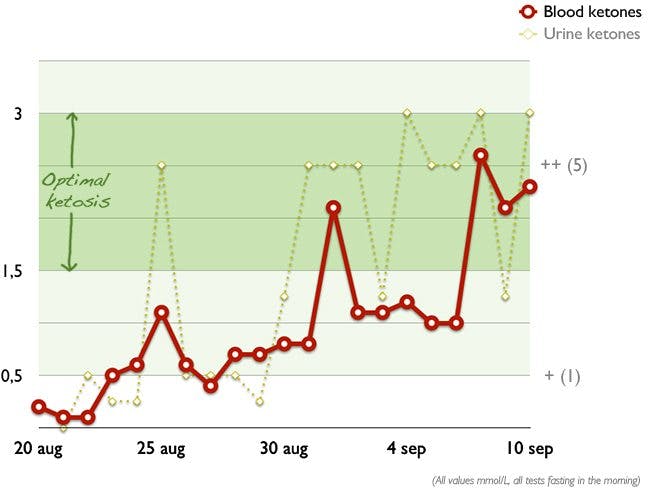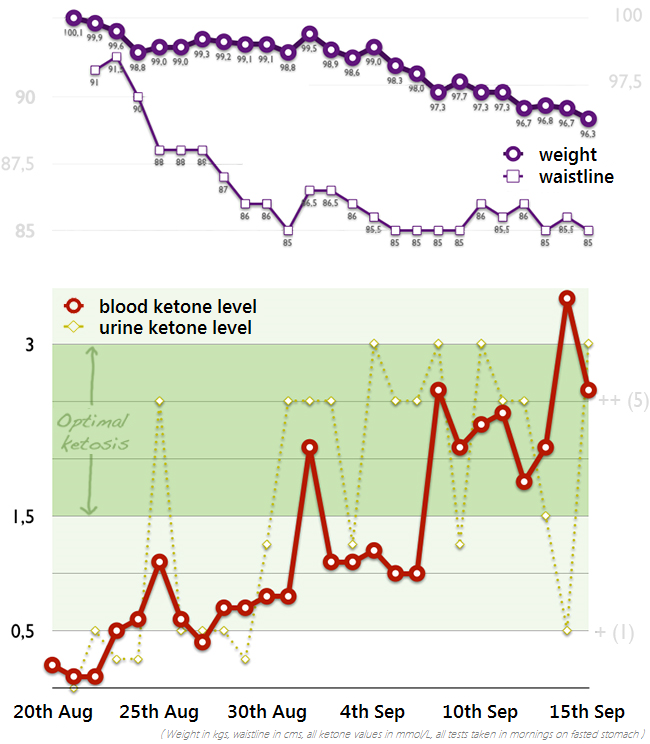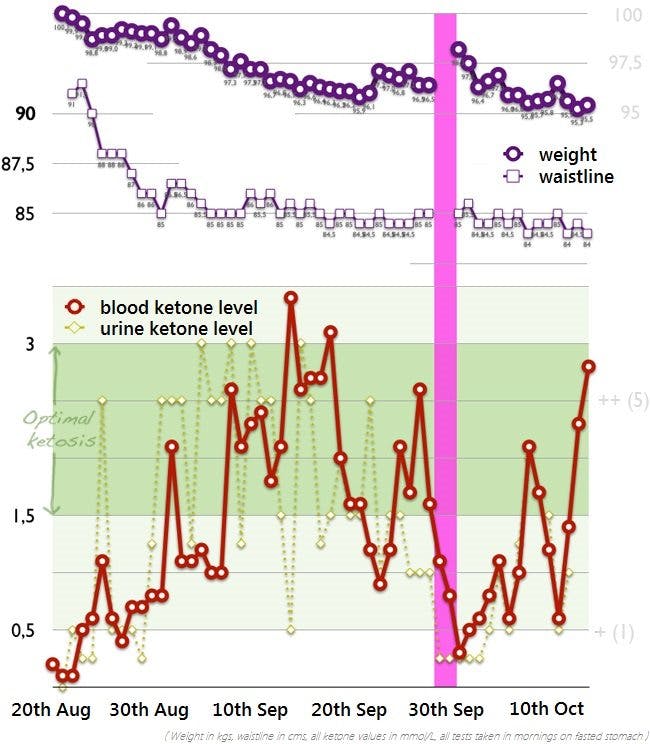Get into optimal ketosis
Warning: Not recommended for type 1 diabetics.
Any people stalling at weight plateaus while on a low carb diet have found optimal ketosis helpful. It’s what can melt the fat off once again.
So how does this work? A quick run-through: The first tip was to eat low carb. This is because a low-carb diet lowers your levels of the fat-storing hormone insulin, allowing your fat deposits to shrink and release their stored energy. This tends to cause you to want to consume less calories than you expend – without hunger – and lose weight. Several of the tips mentioned above are about fine-tuning your diet to better this effect.
How do you know you’re getting the maximum hormonal impact from your low-carb diet? You do that by achieving what’s known as “optimal ketosis”.
Ketosis
Ketosis is a state at which the body has an extremely high fat-burning rate. Even the brain runs on fat, via ketone bodies. These are energy molecules in the blood (like blood sugar) which become fuel for our brains after being converted from fat by the liver.
To encourage ketone production, the amount of insulin in your bloodstream must be low. The lower your insulin, the higher your ketone production. And when you have a well-controlled, sufficiently large amount of ketones in your blood, it’s basically proof that your insulin is very low – and therefore, that you’re enjoying the maximum effect of your low-carbohydrate diet. That’s what’s called optimal ketosis.
Measuring ketones
Today, there are reasonably-priced gadgets available for measuring ketone levels at home. One needle prick of the finger, and in just a few seconds you’ll know your blood ketone level.
Blood ketones are best measured on a fasted stomach in the morning (before breakfast, that is). Here are a few pointers on how to interpret the result:
- Below 0.5 mmol/L is not considered “ketosis”. At this level, you’re far away from maximum fat-burning.
- Between 0.5-1.5 mmol/L is light nutritional ketosis. You’ll be getting a good effect on your weight, but not optimal.
- Around 1.5 – 3 mmol/L is what’s called optimal ketosis and is recommended for maximum weight loss.
- Values of over 3 mmol/L aren’t neccessary. That is, they will achieve neither better nor worse results than being at the 1.5-3 level. Higher values can also sometimes mean that you’re not getting enough food. For type 1 diabetics, it can be caused by a severe lack of insulin, see below.
Ketones in urine
Ketone levels can also be measured in a more old-fashioned way, with urine test sticks (sold prescription-free in pharmacies or on Amazon). Ketone sticks give less reliable results for several reasons, and the above recommendations can’t be straightforwardly applied to them.
My personal experience

Can measuring ketones help you lose weight and improve performance? Let’s try to find out.
Today my ketone experiment reached goal #1: achieving stable optimal ketosis*.
After getting my blood ketone meter I’ve eaten a stricter LCHF diet than I usually do. More fat, less carbs. No bread, no potatoes, pasta, rice or fruit. Instead I’ve eaten meat, fish, vegetables, egg and extra large amounts of high-fat sauces and butter. In the mornings coffee with plenty of butter/coconut fat in it. I’ve occasionally cheated with some nuts, root vegetables, berries, cream and a little wine.
After just a few days I entered light nutritional ketosis (over 0.5 mmol/L on the meter). But it took a full three weeks to achieve stable optimal ketosis (1.5 – 3 mmol/L) in the mornings. It was also interesting that it was much quicker to get high ketone readings during daytime and in the evenings (data not shown in the chart above).
I’ve also tested keto sticks for measuring urine ketones (cheaper and simpler). In my case the results so far track the blood ketones reasonably well, even if urine ketones is a more inexact and unreliable test.
So what do you think I’ve noticed? Does it feel different? What do you think happened to my weight & waist measurement (I started at a normal satisfactory weight) and training/mental performance? Answers are coming up, but feel free to guess in the comments!
Ketosis
*/ Ketosis is a natural state where the body is almost only burning fat.The secret of ketosis is to eat very low amounts of carbs and only moderate amounts of protein. Then add fat to satiety.
Some less informed people still confuse natural ketosis with the pathological stateketoacidosis. The latter has completely different causes, usually extreme insulin deficiency in type 1 diabetics. In this dangerous state the ketone koncentrations are around ten times higher then in normal ketosis, and the blood sugar is sky high.
Natural ketosis due to low carb eating is perfectly safe with stable well-controlled blood sugar and well-controlled blood ketones.
Four Weeks of Strict LCHF and Ketone Monitoring
Can ketone measurement help you lose weight and improve performance?
Below are graphs of my weight and waistline over this first four-week period, as well as the results of blood and urine ketone measurements.

After two to three weeks of light nutritional ketosis, I’ve now spent 8 days in “optimal ketosis” – that is, between 1.5 – 3 mmol/L. Want to know what’s happened?
The effects of optimal ketosis
Weight
Although happy with my weight before this experiment, I’ve become noticeably leaner: -4kgs (9 pounds) and -6cm (2,5 inches) around the waist. This, of course, in complete absence of hunger – in fact, I’ve seldom felt so constantly sated. Food is tasty to eat at mealtimes, but I can skip a meal without even blinking.
My weight – initally 100kgs – was already well within normal range, considering I’m 202 cm tall – 6 feet 7 inches – and do strength training regularly. The other measurement I kept track of was my waistline. 94cm or less around the waist is considered excellent for men; I started out with 91cm, and am now around 85cm (33 inches). I need to punch a new hole in my belt, which means I’m leaner than I’ve been in a very long time. Not bad for a forty-year-old father who has limited time to work out and always eats his fill!
Mental effects
Being the father of a small child, I often get tired from lack of sleep, and during the first week of the experiment I sometimes felt even woozier than usual. This is natural while the brain adapts to running on ketones.
The last two weeks brought everything back to normal again. Or perhaps I even felt sharper and found it easier to focus for longer periods of time? Hard to tell. Perhaps it was just my imagination.
Some people have mentioned having more colourful, dramatic dreams when in ketosis – at least during the first period. I actually think this was the case for me during the first couple weeks, too.
Exercise
Due to a tight schedule, my exercise has been limited to one short weekly strength routine at the gym, in the style of “Body by Science”. I take note of the weights and times I manage though, which makes it easy to compare my weekly performance.
- The first session, following one day of strict LCHF, was nothing out of the ordinary.
- The second and third sessions, after 7 and 17 days respectively, showed a marked performance decrease. My muscles tired more quickly.
- The fourth strength training session, 26 days in, showed a better result than when I started.
Just as I had expected, exercise was tougher the first weeks of strict LCHF. However, four weeks in I was back at my original strength level – despite losing weight.
The combined result of less body fat while keeping (or slightly improving) my strength level reminded me of the new study conducted on elite gymnasts. Being stronger with less body fat is certainly much coveted by athletes.
Other early effects of ketosis
Another thing I noticed during the last week, i.e. during the most pronounced ketosis, is the diuretic effect. I was copiously leaking ketones (as is evident from the urine ketone levels), which take a lot of water with them going out of the body. A few of the days I drank lots of water trying to quench a stubborn thirst, and consequently paid frequent visits to the bathroom. My mouth felt dry no matter how much I drank.
Today, this is much less noticeable. Perhaps my body is adapting. Many people seem to stop leaking ketones through urine in the longer term, coupled with still being in ketosis according to their blood ketones. I’m excited to see if the same will happen to me.
A similar trend can be noted with the breath issue. The first days or weeks of ketosis, many exhale small ketone bodies, acetone. Ketosis breath has an odour reminiscent of fruit (that’s putting in nicely – others put it right up there with rotten apples), and may also be reminiscent of nail polish removers (which often contain acetone). If you find yourself experiencing this, bear in mind that it generally disappears in a couple or several weeks*. I’ll just wait and see if that’s true for me too, as I’ve had that kind of breath once in a while.
Sense of taste
Another interesting thing I’ve heard people mention during ketosis is the way they experience sweet tastes. For my part, I never drink soda and almost never eat any kinds of sweets as it is. I do however tend to enjoy fruits and berries regularly. Of course, striving for optimal ketosis means completely abstaining from everything sweet, and after doing so for a couple weeks, I one day mindlessly ate a piece of banana my daughter gave me. It felt like an explosion of sweetness. The fewer sweet things you eat, it seems, the more your sense of taste adapts.
The same principle appears to work the other way as well. Those addicted to sugar and used to consuming large amounts of sweets/artifical sweeteners daily, will have a hard time registering the sweetness of something only fairly sweet.
Transition troubles
From what I’ve read and heard, the first week of strict LCHF seems to commonly bring headaches, dizziness, tiredness, palpitations and irritability. I felt none of these things, save for a slight “woozy” feeling on some of the first days. This is probably because my everyday liberal LCHF diet should mean already I’m partly ketone-adapted. The lack of heavy transition troubles can also be because I took care to stay hydrated and get enough salt, which usually keeps the worst symptoms at bay.
Summary
This is going well so far.
- Weight loss without hunger, even down to being very lean. It’ll be interesting to see where my weight stabilises; I’m guessing, pretty soon.
- An overwhelming sense of satiety, which is quite practical if you don’t have time to constantly be eating.
- The exercise routine seems to be running smoothly now that I’m a few weeks in.
- My mental focus feels at least as sharp as before.
- On the downside, there’s sometimes been a pronounced diuretic effect, and ketosis breath once in a while. Hopefully, these will disappear with time.
I’m going to keep this going for a while more, to try and experience the full effects of ketosis, and also to be able to perform some interesting and accurate experiments with different types of food and ketosis. More reports to come!
Final Report: Two Months of Strict LCHF and Ketone Monitoring

What happens if you hugely digress from a low-carbohydrate diet and suddenly eat a whole load of carbs?
Here is my final report following two months of a very strict LCHF diet, and daily measurements of four parameters:
- Blood ketones (the red curve)
- Urine ketones (yellow)
- Weight (purple)
- Waistline (purple)
As you can see from the above graph, I took the opportunity to conduct a side experiment. The pink vertical column marks one weekend where I consciously completely deviated from the low-carbohydrate diet. I was on the Swedish archipelago “Koster” for the year’s lobster premiere, and simply had the same food as everyone else.
So, what happens if you totally veer off the low carb lifestyle after a long period of strict LCHF? Is complete havoc wrought in your body? Do you have to start from scratch again? Here’s the answer:
Lobster weekend
Here are the non-strict LCHF foodstuffs I consumed during the weekend of 28-30th September:
- Three small helpings of pasta
- One “Digestive” biscuit
- A total of 7 slices of bread!
- Some orange juice x 2
- Some chocolate (70% cocoa content)
- Liberal helpings of nuts
- Liberal helpings of sorbet and honeymelon
- Yoghurt with müsli and apple
- An unspecified number of wine glasses (many)
- A pizza!
Result
After finishing off that pizza on my way back home on the Sunday, my ketone meter read “LOW” – that is, a negligible amount of ketones. The ketosis was gone.
I’m sure you’re curious as to how long it takes to return to ketosis after such a monumental digression. Some have claimed it can take up to two weeks, but for me, it didn’t:
- The morning after, I was at 0.3 and one day after that I was at 0.5, which means I was back in ketosis. It took a week for me to get back to my previous “optimal” levels of over 1.5.
- The scales immediately showed +2kgs (+4.5 lbs), but these vanished in a couple of days. In other words, it was all water and glycogen weight. My waistline saw little or no change at all.
- I felt alright the whole time.
Summary: An entire weekend of cheating took me a few days to a week to bounce back from. That’s of course keeping in mind I was very keto-adapted going in. I can however imagine that some people may need more time.
Weight results after two months
As mentioned in my earlier accounts, weight loss was not my ambition when starting this experiment. I was happy with my weight and waistline, which I’ve kept for years with the more liberal LCHF diet I stick to. Interestingly, I still lost a total of 4.5kgs (almost 10 pounds) and a whopping 7cms (over 2.5 inches) around my waist. This happened without the slightest hunger pang.
I had to punch a new hole in my belt. My trousers were falling off – that’s how noticeable it was. I have however kept my original weights at the gym, so I’m assuming there hasn’t been significant muscle loss. This in spite of the fact that I’ve only found time to work out about once weekly.
Lessons learned
The biggest lesson I’ve learned during these two months is how much the effects of a strict LCHF diet can be intensified when taken to optimal ketosis. Also, I’ve seen that it takes more than just great care with carbohydrate to achieve deep ketosis; in fact, you need more fat and less protein than many believe. Too much protein tends to actually inhibit optimal ketosis (a ketone level of over 1.5), instead making it easy to stall at around 0.5.
A handy way to consume more fat and less protein is to drink your coffee with butter and coconut oil (mix with a blender!). One or two mugs of this kind of “fat coffee” gets you feeling so full you won’t be eating too much meat, fish or eggs. Perhaps this brings an environmental as well as monetary saving?
No comments:
Post a Comment